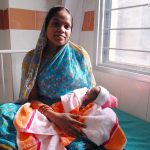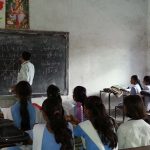Almost 700 million people around the world live in extreme poverty (on less than $2.15 per day), according to the World Bank. And although children only account for 31 percent of the world’s population, they comprise more than half of those living in extreme poverty.
Global inequality is also on the rise, thanks in part to the COVID-19 pandemic. Since 2020, five billion people have become poorer, while the world’s five richest men have more than doubled their fortunes—at a rate of $14 million per hour, according to Oxfam.
Researchers from the Keough School of Global Affairs recently met with British and European academics and development practitioners to discuss new ways to address poverty, inequality and environmental injustice, including utilizing interdisciplinary research to inform global policy decision-making.
“Poverty and inequality reinforce one another and directly undermine the quality of democracy, educational mobility, food security, environmental adaptation and more,” said Andrés Mejía Acosta, associate dean for policy and practice at the Keough School of Global Affairs and organizer of the workshop. “In order to truly make change, it is imperative that we approach these problems from different disciplines and bring together experts who can inform policy solutions to reduce their negative impact and protect human integrity.”
The workshop, hosted by the Keough School, Notre Dame International and the University of Notre Dame’s London Global Gateway, featured top scholars including economists, sociologists, historians, political scientists, ethicists, and an engineer, who are working at the intersection of poverty and inequality and environmental justice. Representatives came from the University of Oxford, Cambridge University, King’s College London, the University of Hamburg, the University of Sussex, the University College London, the United Nations Development Program, World Bank and the World Inequality Lab.
Over two days, the group discussed the political economy of lifting people out of poverty, inequality and environmental justice; the role of social policies on poverty reduction outcomes; methods and approaches to measuring poverty and inequality; and policy and political challenges to reducing these issues. The workshop was part of the Keough School’s Global Policy Impact strategy which helps bridge research and policy demands to help policymakers and practitioners develop effective, context-sensitive proposals to address some of the world’s most pressing needs.
As part of the event, George Gray Molina, head of inclusive growth and chief economic advisor at the United Nations Development Programme, presented a projection of what future global economic growth might look like.
Molina emphasized that while the last period of global economic growth delivered gains for developing countries in poverty reduction, jobs and incomes, that growth has significantly slowed down. In the future, he said, economic growth will be balanced by also considering environmental concerns.
“Rather than maximizing gross domestic product per capita — with no emissions constraint — countries will race to achieve the highest standards of living within planetary boundaries,” he said. “This will be the challenge of our times.”
With experience in both academia and policy, Molina stressed the importance of bridging the gap between policymakers, academia and the people who are directly impacted by these issues.
“This is a moment in which we need to address human well-being at the same time that we look at policies and structures that impact some of the world’s most vulnerable populations,” he said. “We know a lot of the policies that are needed, but we have to start engaging the people impacted by these issues.”
The workshop concluded with a public keynote event by Molina and Catherine Arnold, Master of St. Edmund’s College at the University of Cambridge.
A well-renowned scholar on issues such as human rights, counterterrorism, trade and public affairs, Arnold discussed the challenges of poverty, inequality and just decarbonization from a development perspective. She also discussed the Keough School’s commitment to advancing integral human development — a multifaceted concept that prioritizes the dignity of all people — and stressed that the way society, academics, and organizations communicate can have an impact on how we address these issues.
“In the midst of the scale and complexity of these global challenges, we need ethical frameworks such as integral human development that are simultaneously simple and sophisticated,” she said. “They keep us focused on things that really matter, the individual people and our planet, and help us recall that development is something that we all need to participate in, in our institutions, political systems, societies and as individual practitioners, voters and tax-payers, not something that solely happens to others.”
With continued support from the Keough School, researchers will reconvene in the summer to further ways to work together.


